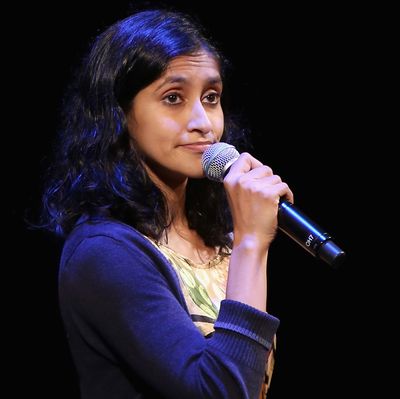
It’s okay to laugh about anxiety and depression — Aparna Nancherla is giving you permission. The former Late Night With Seth Meyers writer addressed both topics on her comedy album, Just Putting It Out There, released on Tig Notaro’s label this summer. And she’s known for tweeting about them, too, leading Rolling Stone to put her on a list called the 25 Funniest People on Twitter Right Now.
On the phone, Nancherla sounds less deadpan than when she’s performing, but she still doesn’t seem remotely worried about making you feel sorry for her. If anything, the D.C. native seems more concerned with finding innovative ways to keep mental-health material entertaining, though she also makes plenty of space for jokes about other topics, like dating.
Ahead of the release of a new season of her absurdist web series, Womanhood, Nancherla talked to the Cut about her online persona, getting paid to be funny, and the elusive definition of vocal fry.
You’ve said before you don’t like being pigeonholed as a comedian who’s a woman, or a woman of color. But in the wake of conversations surrounding the experiences of these groups, do you ever feel pressure to give your two cents publicly?
I think Mindy Kaling has said things in interviews like, “My white male colleagues don’t get asked these questions.” They’re asked about their work; it doesn’t become about their identity. I totally understand if that isn’t what you wanted to talk about in an interview, but I do think if you’re one of the few faces of a group coming up in a field, people are like, How did you do it?
I guess I get it: When you’re in a group that sticks out, you’ve probably spent a lot of your career trying to make yourself less of an other by saying, “I’m just like you!” So I think it’s funny that once you do make it, people keep asking questions that suggest you’re not like them. And you’re like, “No, I am — that’s how I got here!”
What was it like writing for Seth Meyers?
Going into Seth, I didn’t know if writing for talk shows is what I want to be doing, and it kind of confirmed it. I was writing monologues. You’re writing five or six pages of jokes a day, and it’s a very disciplined, repetitive art form. Some people are really good at it — there is a science to it, and I feel like I write jokes so much less analytically than other people do.
How much does your Twitter persona represent your true self?
I think it’s pretty close to my own inner monologue. It’s definitely a little heightened for comedic effect, but for the most part it’s pretty close to who I am.
How do you feel about Sad Girl Twitter, in which women talk about mental health and depression?
I definitely appreciate it, as someone who relates to those issues and has plenty of tweets that fall into that realm. The counterargument I see is people think it’s a little oversaturated, or people are like, Why is it funny when you’re such a mess? The challenge is — if you actually deal with those issues — finding new ways to talk about it. It all blends together and you’re like, All right, you’re sad, we get it.
On your comedy album, you have a bit about online dating. What are the challenges of dating as a comedian? Do people think you’re using them as material? Do you ever get the sense they’re going to steal your jokes?
Now, people are less likely to say Tell me a joke or something. There’s a better understanding of comedy and its workings overall, maybe because the proliferation of podcasting. People seem to understand the behind-the-scenes better than they may have in the past because there’s more accessibility to artists.
On Womanhood, there’s an episode that discusses periods. What do you think about all the new period tech: Thinx underwear, menstrual discs, etc.?
It would be great to not have to go through so much paper or cardboard or plastic every month. I have boxes of tampons, but then I think about all the other women who do, and it’s so much! It feels like we have to figure out something else. I’m all for period technology.
You have a very distinct voice. Do you ever feel pressure to sound a certain way, given all the conversations surrounding uptalk and vocal fry?
I think I’ve always used my regular voice. I’ve been told I have a unique-sounding voice, but I don’t think I necessarily cultivated it. Maybe I unconsciously picked up sort of a midwestern accent or phonality or something — I frequently get asked if I’m from the Midwest, and I wonder if I’m somehow appropriating that. But it’s funny, I’ve heard all the stuff about vocal fry and I still don’t really understand what it is.




